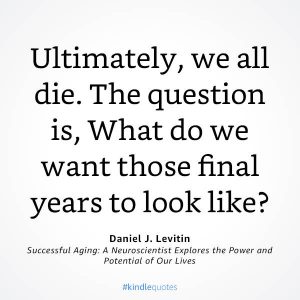By Steve Moran
Ultimately, we all die. The question is, what do we want those final years to look like?

I am reading this book, “Successful Aging”, and it should be on your list if you are a senior living professional. The author, Daniel Levitin, asks this profound question:
What Do We Want Our Final Years to Look Like?
Our Value Proposition
Right now senior living at its core says, “For many, maybe even most, older people we have the best possible answer.” As subtext, we offer two value propositions:
- Safety and security
- Socialization, an antidote to loneliness
We are actually doing a pretty good job of this. Most people who live in senior living are glad they made that choice. Mostly families with loved ones in senior living are happy with their decision. Normally, I spend a lot of time knocking around airports. And as an extrovert, I end up in lots of conversations with strangers. I am continually surprised at the number of people I meet who tell me they have a loved one or a friend who either lives in a senior living community or lived in one previously.
I always ask if it is/was a good experience and better than 95% describe it as a really positive experience. When I do hear complaints it is always that the local management is not as responsive as they wish they were. The other complaint is that it appears there is not enough staff.
But the Challenge Is
I am in the same boat that most other senior living professionals are, thinking it should be better than it is. That I would not really want to move into the bread and butter senior living community that you find is nearly every area.
Maybe we actually have this wrong and that what we are selling today is actually a lot better than we think it is. I know there are things that I had to have at age 20 that today at age 65 I see as a total waste of money.
Maybe the real and exciting truth is that what we are selling today and what we will be selling to Boomers, even if it looks more or less like it does today, will be exactly the thing they need . . . at least in the context of what they can afford.
My challenge to all of us is this:
MAYBE WE ARE BETTER THAN WE THINK WE ARE.







